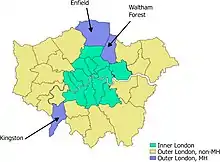Mini-Hollands
The Mini-Hollands scheme was introduced in March 2014 by Boris Johnson, then Mayor of London. It took the form of a competition among outer London boroughs for a £100 million fund. Three boroughs - Waltham Forest, Enfield and Kingston - won £30m each, and the remaining £10 million was shared by several other boroughs.

The scheme supported the boroughs to build Dutch-style cycling infrastructure such as traffic calming, segregated bike lanes, safety measures at junctions and blocking residential streets to car traffic. It aimed to encourage modal shift from car to bike for short journeys.[1]
Borough plans
Enfield:
- separate bus and cycle lanes and the prohibition of through traffic in Church Street
- A Dutch-style roundabout with segregated cycle lanes at Edmonton Green
- lightly segregated cycle lanes along the A1010, A105 and A110
- a network of Quietways and Greenways across the borough
- cycle hubs providing bike parking at Enfield Town and Edmonton Green railway stations
Waltham Forest:
- traffic calming in Walthamstow Village, Leyton and Leytonstone, including several dozen blended ‘Copenhagen’ crossings,[4] with continuous footways across side streets
- 22 kilometres of segregated cycle lanes, including 4 kilometres of Lea Bridge Road
As a result, Waltham Forest won the 2017 London Transport Award for ‘Transport Borough of the Year’.[5]
Evaluation
In June 2018 the Guardian reported[6] on a study by Westminster University[7] which interviewed 1,712 people in the three boroughs. The study found that after one year:
- While cycling increased by an average of 9 minutes a week, walking increased by 32 minutes a week;
- there was no evidence that the mini-Hollands benefited cycling at the expense of other modes: for example that time spent in cars was increasing due to congestion, or that walking was becoming less attractive;
- There was no significant reduction in overall car use;
- public attitudes to cycling became more positive, across demographic and socioeconomic groups.
Research published in the March 2021 edition of the Journal of Transport & Health[8] measured the programme's impact on local residents. Among these are:
- health economic benefit of £724m from interventions costing £80m
- increased likelihood of meeting active travel and physical activity targets
Criticism
In February 2018, CityMetric criticised the slow roll-out of the programme and reported flaws in public consultation and opposition from some residents.[9]
References
- "Transforming cycling in outer boroughs: Mini-Hollands programme". London City Hall. January 18, 2016.
- "Kingston Mini Holland".
- The Royal Borough of Kingston upon Thames. "The Go Cycle Programme". www.kingston.gov.uk.
- "Blended 'Copenhagen' Crossings | Enjoy Waltham Forest". enjoywalthamforest.co.uk.
- "Waltham Forest bags transport awards". Waltham Forest Council. 2019-03-13. Retrieved 2020-10-30.
- "'Mini-Holland' schemes have proved their worth in outer London boroughs | Peter Walker". the Guardian. June 26, 2018.
- Aldred, Rachel; Croft, Joseph; Goodman, Anna (1 May 2019). "Impacts of an active travel intervention with a cycling focus in a suburban context: One-year findings from an evaluation of London's in-progress mini-Hollands programme". Transportation Research Part A: Policy and Practice. 123: 147–169. doi:10.1016/j.tra.2018.05.018.
- Aldred, Rachel; Woodcock, James; Goodman, Anna. "Major investment in active travel in Outer London: Impacts on travel behaviour, physical activity, and health". ScienceDirect. Journal of Transport & Health. Retrieved 2 February 2021.
- "Has London's outer borough cycling scheme worked? Mini Holland, four years on | CityMetric". www.citymetric.com.
External links
- Waltham Forest Mini-Holland Design Guide:
- Department for Transport Case study: London Mini Hollands - Building Dutch-style cycle infrastructure in outer London boroughs: London Mini Hollands
- Slide presentation Waltham Forest Mini-Holland Tour (September 2016):
